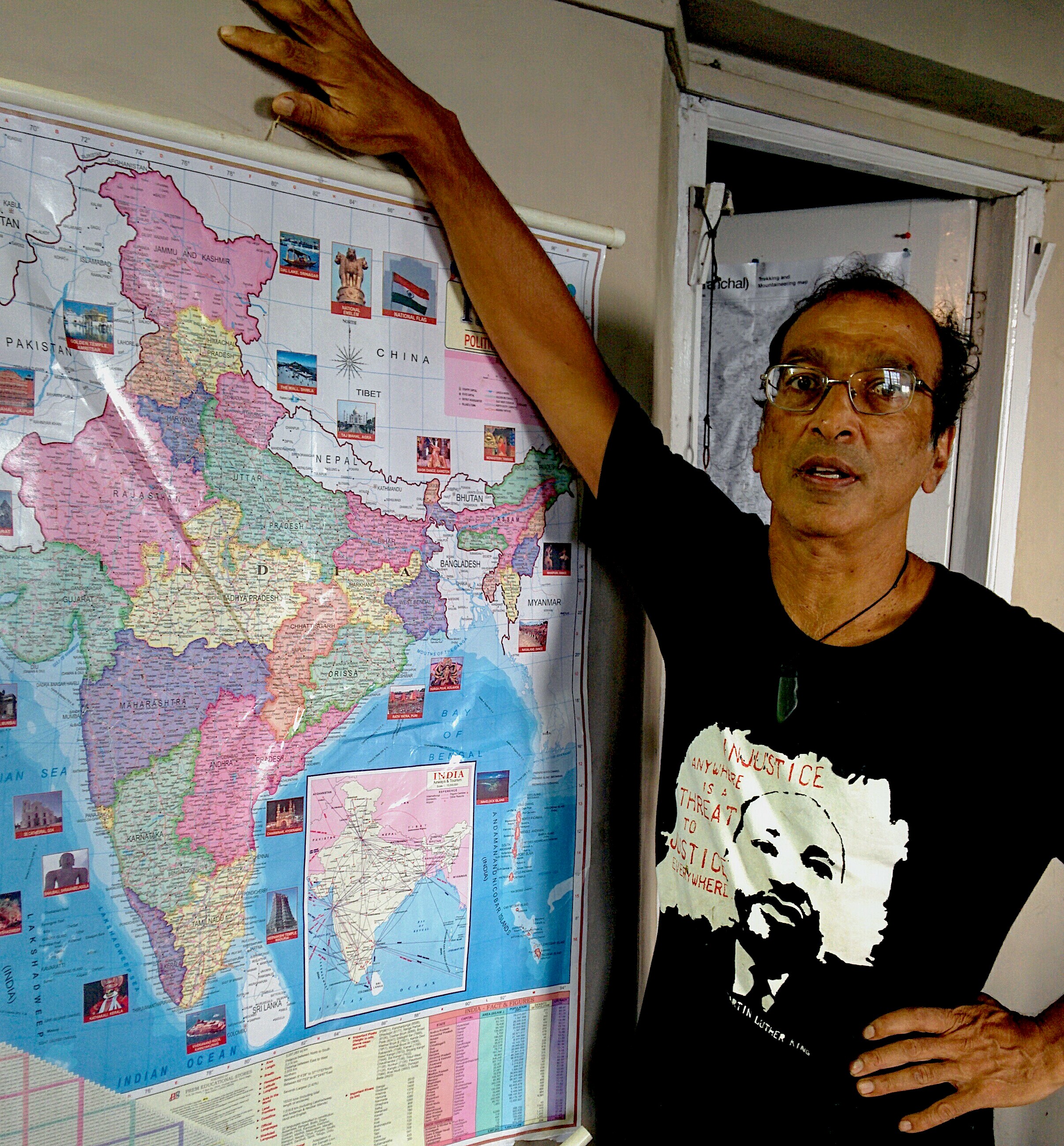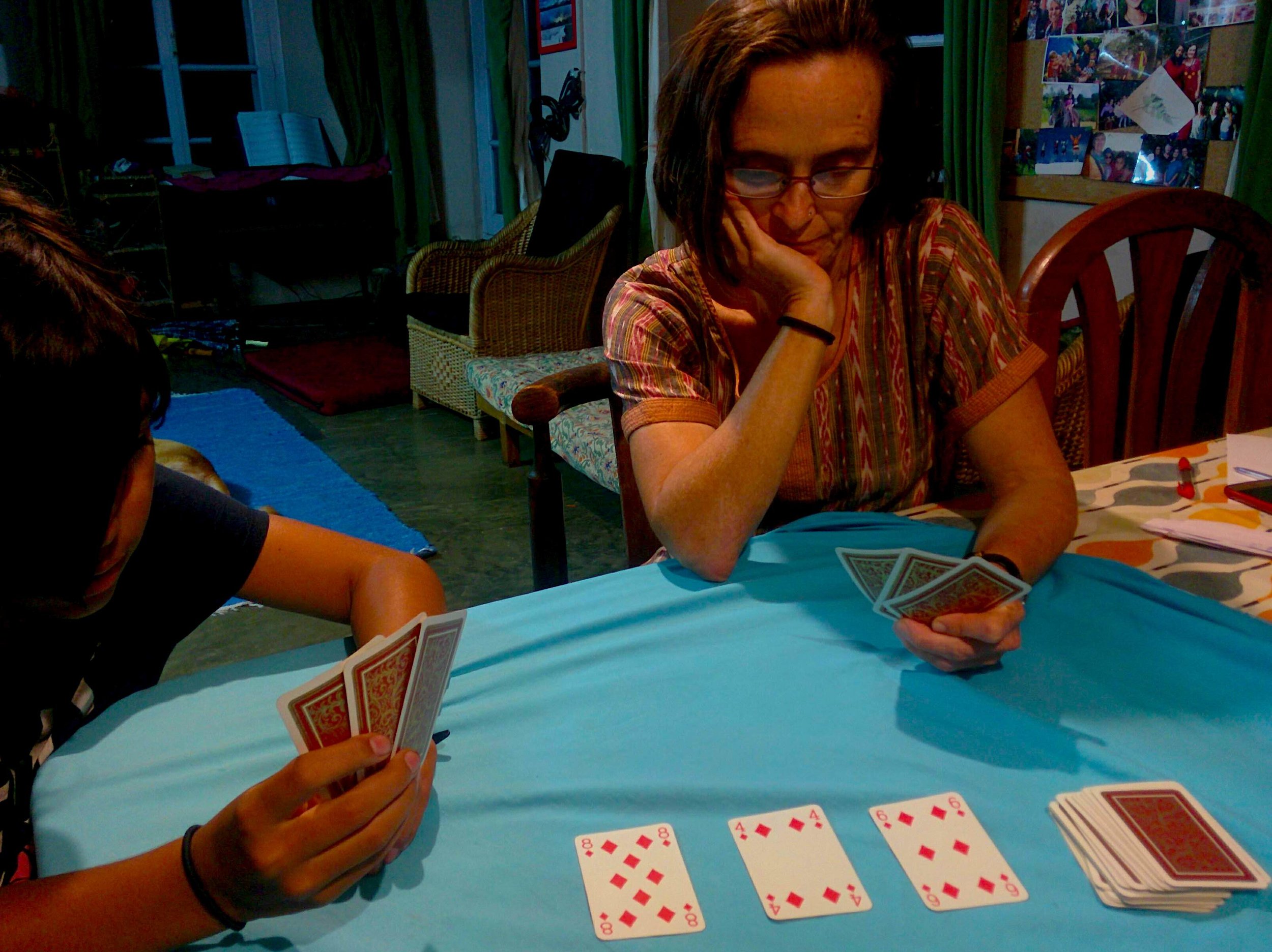Now and then on this blog I dip into game theory- the mathematical and logical exploration of why people follow different strategies in different circumstances. Game theory touches the part of me that loves ideas, enjoys mathematics, plays with models... it speaks to my inner geek. However understanding the drivers of human behaviour is also highly practical, critical even, for anyone taking an outcome based approach to development. For me development is all about what people do, why and what might get them to act differently. Game theory can often unpack non-ideal human behaviour when better answers seem so obvious- which happens a lot out there in the real world.
What to play? That depends on all past moves, my current hand and my best-guess prediction of the other players' future moves.
Up to now game theory in this blog has been Normal form and static games. Essentially these represent each player's strategy in a matrix, with payoffs related to what the other player does. There have been posts of the Prisoners dilemma, the Nash equilibrium, hunting stags etc. Often in these games players make non-ideal decisions for good rational reasons. In one post I argued that open defecation on Pondicherry beaches was an example of this. But mostly the world is not really like this. Humans sliding into armed conflict or small farmers making planting decisions are using strategies co-evolved via iteration after iteration of acting, seeing what others do and then responding based on the new configuration of their development space. In game theory such continuously evolving situations where the results of all players previous move create the next situation are called “extensive games”. In extensive games game theory tries to unravel decisions at each node in these dynamic decision trees, strategies that make sense in the changing development landscape, and critical conditions for players to make other decisions. This has obvious resonance out in the messy, non-mathematical landscape we work in, where we want groups of people to, say, decide to lay down arms or farm organically. Extensive form games are much closer models of the real world than single choice, static games like the prisoner’s dilemma.
A weak hand, no trumps. That's- what so many poor people gt, embryo deal.
Real world games are much more like cards or squash- within a court, a card table or a market area one decides what to do based on all previous moves in this game, memory of how other games have played out, what is in my hand right now, and what I think all other players in the space will do in the future. Its dynamic too, my hand changes every move, points change as the game plays out, other hands change. An Indian farmer deciding to start organic farming integrates a lot into a dynamic game to make that decision. So too a village kid deciding to take up guerrilla warfare back when I was a MSF doctor in Colombia. So many people we work with have few options in their 'decision making hands'- none of them trumps. One role of development is to make more choices available to poor people.
Clever people spend their lives investigating how extensive games play out so clearly I am not going to be able to unravel all the complexities in a 500 word blog. I'll summarize this way: if the static game question is “how can non-rational behaviour be derived from a set of players making single rational decisions?” extensive games can ask the converse- “how can good strategies evolve iteratively from non-rational humans’ repeated decisions?”. Somehow “rational” has a different meaning on group and individual levels. Right now in a Neo-liberal model. of severn billion "rational economic men" are together cooking their planet with greenhouse emissions. Rational individually and idiotic collectively! Extensive games are all about the decsisions groups of humans make. So is development. Game theorists and development specialists know that the smallest unit of our work- individual human beings- are non-rational. Non-rational because each of us puts things like valuing the future, trust, revenge on those who cheated you in the past etc. into our decisions. We all also continuously make our decisions despite “ bounded rationality” (incomplete information), presentation bias (the same information evokes different thinking depending on how it’s presented) etc. It’s a huge an complex field but the question of how non-rational players with different power, knowledge and payoffs can co-operate, evolve coherent group strategies is the essential question of the huge and complex field of game theory. How humans can together develop coherent group strategies is the essential question of development. Another huge and complex field!
This Indian villager chose to organically farm kiwi fruit because of what other farmers are doing, his soil, the technical advice of a Japanese organic specialist available to him and his prediction of the future buying habits of consumers 100 km away. Much more complex than poker! (photo from MGVS field work)
So just for fun if you have 20 minutes here’s an interactive computer model of an extensive game that delves into how trust evolves. Play with it and let some surprising and some totally intuitive insights play out as your choices interact with others' past and future choices. Let me know if you find it useful- or just if it is fun.













